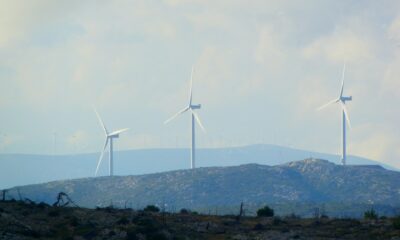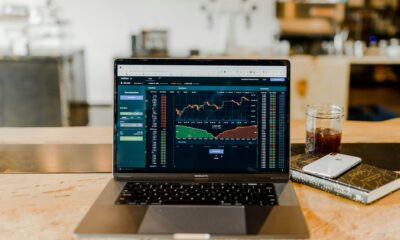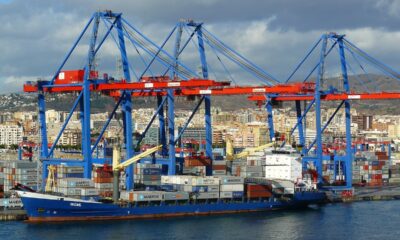Featured
ESG Criteria is Crucial for Outperformance and Resilience, Study Shows
Over 2020, the portfolio with the best ESG scores posted a 15% return, outperforming the portfolio with the worst ESG scores (Flop 40) by a factor of 68. At the same time, the MSCI Europe SRI Index (+1.4%) outperformed the Flop 40 portfolio (0.2%) and the MSCI Europe Index (-3.32%). During the spectacular market crash in the first quarter of 2020, the top 40 portfolio performed the best with a performance of -19.1%.

ESG criteria are an outperformance factor and an essential prerequisite for companies’ resistance to crises. That is confirmed by the current “SRI & Performance Study by LFDE”, which was conducted by the French asset manager La Financière de l’Echiquier (LFDE) for the third consecutive year.
“The extraordinary year of 2020 in particular, with its rapid market collapse and equally rapid recovery, demonstrated how resilient SRI investments are during crises,” said Coline Pavot, Head of SRI Research at LFDE.
Read more about the importance of ESG criteria for outperformance and resilience and find the latest finance news with the Born2Invest mobile app.
Stable outperformance
Over 2020, the portfolio with the best ESG scores (Top 40) posted a 15% return, outperforming the portfolio with the worst ESG scores (Flop 40) by a factor of 68. At the same time, the MSCI Europe SRI Index (+1.4%) outperformed the Flop 40 portfolio (0.2%) and the MSCI Europe Index (-3.32%).
Positive impact on crisis resilience
During the spectacular market crash in the first quarter of 2020, the top 40 portfolio performed the best with a performance of -19.1% and a maximum drawdown of -34.6%, while the flop 40 portfolio posted a performance of -30.5% and a maximum drawdown of -39.1%. ESG criteria are thus proving to be important factors in the resilience of companies during periods of extreme downturns in the financial markets
Resilience does not rule out rapid recovery
While the stocks in the Flop 40 portfolio took a full 323 days to recover to their pre-crisis levels, the stocks in the Top 40 portfolio needed just 264 days – 59 days less. The best ESG profiles thus showed significantly better recovery momentum than the worst profiles.
Correlation of ESG and performance increases
Over 11 years, the portfolio with the best ESG ratings in our investment universe (Top 40) outperformed the portfolio with the worst ESG ratings (Flop 40) by 3.2 times. Outperformance has thus increased by 2.3 times over 9 years (2019 study) and by 2.6 times over 10 years (2020 study) again in the past year. Previous studies have already presented evidence of the close correlation between the consideration of environmental, social and governance (ESG) criteria and long-term financial performance. Now, however, it also appears that the correlation between responsible investing and performance is becoming more intense. However, the higher outperformance was not associated with higher volatility.
Avoiding companies with poor governance (G) important
Individually, all environmental, social, and governance criteria are sources of performance. Over 11 years, the performance of the portfolio with the best ratings for the criterion ‘social’ (+362%), with the best ratings for corporate governance (+262%), and with the best ratings for the aspect ‘environment’ (+233%) is higher than the performance of the portfolios with the worst ratings for the respective aspects, of which the best one increased by 185%. However, of all the simulated portfolios, the top 40 portfolio (+399%) still recorded the highest value creation in an 11-year comparison. The portfolio with the worst governance ratings also posted the worst performance (+120%) over the same period. “Investments in the best-rated companies according to ESG criteria offer tremendous opportunities. However, avoiding companies with the worst governance ratings in a portfolio is also critical,” says Pavot.
Commitment further strengthened
Over the past year, LFDE, a pioneer in responsible investment in France for 30 years, has further strengthened its commitment. As of the end of 2020, ESG criteria were taken into account for 92% of assets under management. More than half of assets under management (51%) are SRI or impact investments. Three additional funds have received the French SRI label, bringing LFDE’s total to nine SRI-certified funds. In response to pressing climate issues, LFDE also launched an ambitious climate strategy at the start of 2021 and adapted its climate change policy.
“We believe that the financial sector, led by long-term investors, has an important role to play in financing the fight against climate change. For the first time in the post-industrial era, the world invested more in clean energy rather than fossil fuels in 2020 – so there is reason for hope,” says Coline Pavot.
__
(Featured image by Alexas_Fotos via Pixabay)
DISCLAIMER: This article was written by a third party contributor and does not reflect the opinion of Born2Invest, its management, staff or its associates. Please review our disclaimer for more information.
This article may include forward-looking statements. These forward-looking statements generally are identified by the words “believe,” “project,” “estimate,” “become,” “plan,” “will,” and similar expressions. These forward-looking statements involve known and unknown risks as well as uncertainties, including those discussed in the following cautionary statements and elsewhere in this article and on this site. Although the Company may believe that its expectations are based on reasonable assumptions, the actual results that the Company may achieve may differ materially from any forward-looking statements, which reflect the opinions of the management of the Company only as of the date hereof. Additionally, please make sure to read these important disclosures.
First published in Cash.ONLINE, a third-party contributor translated and adapted the article from the original. In case of discrepancy, the original will prevail.
Although we made reasonable efforts to provide accurate translations, some parts may be incorrect. Born2Invest assumes no responsibility for errors, omissions or ambiguities in the translations provided on this website. Any person or entity relying on translated content does so at their own risk. Born2Invest is not responsible for losses caused by such reliance on the accuracy or reliability of translated information. If you wish to report an error or inaccuracy in the translation, we encourage you to contact us.

-

 Business1 week ago
Business1 week agoCardCash.com Pulls off Massive Turnaround in Ramp Up to RSTN Nasdaq Uplisting
-

 Cannabis2 weeks ago
Cannabis2 weeks agoThe UN Has Never Prevented Canada from Legalizing Cannabis, Despite Treaty Violations
-

 Cannabis6 days ago
Cannabis6 days agoOktoberfest Without Cannabis: German Authorities Are Considering Introducing a Ban
-

 Biotech2 weeks ago
Biotech2 weeks agoVertex Strengthens its Position in Nephrology and Buys Alpine Immune Sciences for $4.9 Billion

























